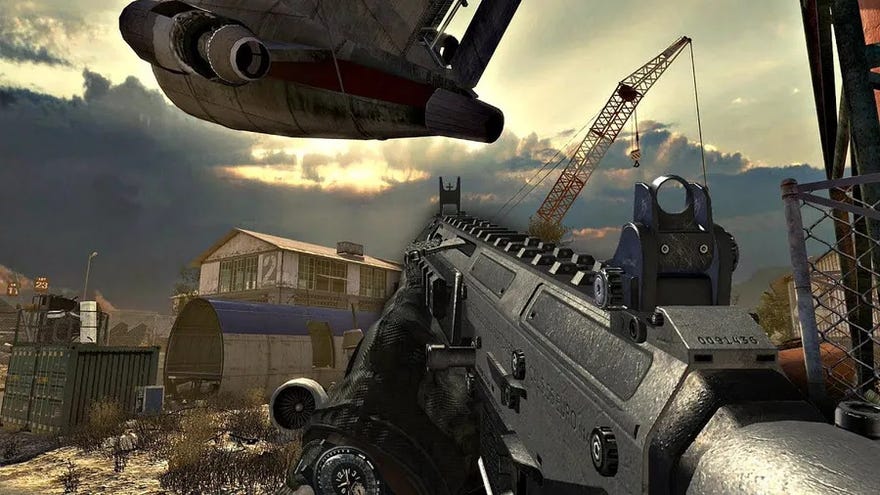How gun giant Remington used Call of Duty to promote weapons to younger players
Firearms company considered games "a primary means" of reaching "the next generation"
Newly released documents have given us a rare inside look at how gun manufacturers have tried to use videogames to promote their wares to younger people - specifically, players of Activision's original Call of Duty: Modern Warfare 2, released in 2009. The memos and emails in question are from now-defunct US gun company Remington Arms, which was once part of the conglomerate Freedom Group. They've been disclosed by a lawyer as part of legal proceedings launched by the parents of children killed in the 2012 Sandy Hook Elementary School massacre, in which 20-year-old Adam Lanza shot and killed 26 people using a Remington-made AR15 rifle.
According to the docs, which have been written up by the Wall Street Journal, Remington and Freedom Group pursued deals with videogame publishers over the late 2000s and early 2010s, hoping to reach a new generation of potential firearms owners. One undated Freedom Group "Gaming Strategy" memo notes that "with increasing urbanization and access to shooting/hunting areas in decline, a primary means for young potential shooters to come into contact with firearms and ammunition is through virtual gaming scenarios." According to the memo, Freedom Group execs believed promoting their weapons in videogames would "help create brand preference among the next generation," and allow the company to "win our fair-share of these young consumers".
"It really is irony [sic] that video games that just a decade ago were considered the number one threat to gaining new shooters is perhaps now the number one draw," Remington's then-vice president of product management for firearms, John C. Trull, wrote in a 2012 email, quoted in the WSJ report.
As revealed by the disclosed documents, Remington signed a deal with Activision Blizzard in 2009 to feature the Adaptive Combat Rifle or ACR in Modern Warfare 2. The ACR was one of several military semi-automatics Remington hoped to flog to civilians, according to the WSJ. The deal didn't involve an exchange of money, but Activision Blizzard and Remington agreed to keep it confidential.
Not everybody at Remington was happy with the arrangement - or at least, that's what they're saying in hindsight. "If you saw any part of whatever it is, Modern Warfare 1, it was just shoot them, shoot them, shoot them," Al Russo, a former Remington marketing executive, said in a Sandy Hook deposition cited by the paper, adding that the game's representation wasn't how "our products were meant to be portrayed."
Trull, meanwhile, told the WSJ that Remington had little understanding of Call of Duty's multiplayer scene at the time. "The concept of online lobbies where players engaged each other in 'team deathmatches' was unfamiliar," he said. "I believe that if anyone had known then what we know now about how these games evolved, the decisions would have been different."
All that notwithstanding, Remington appear to have had some sense that featuring their weapons in the wrong kind of videogame might be a Bad Look. According to the WSJ, the Freedom Group's "Gaming Strategy" memo forbade the use of the company's brands in games where "non-military bad guys" could be targets, but allowed for the inclusion of digital replicas, noting that this would allow the company to market their products to players without catching any blowback.
"Previous experience tells us people will seek out the brands of the guns," the memo stated. "A lack of direct branding helps to shield us from implications of a direct endorsement while still receiving benefit from inclusion in the game."
The ACR proved popular in Modern Warfare 2 - it returns in this year's Call of Duty: Modern Warfare 3 remake - but according to Trull, this made little difference to ACR sales on the high street. "The fact that the rifle was so popular in Call of Duty was shocking and... it was essentially the only positive thing anyone had to say about the ACR," Trull told the paper. "The product was eventually discontinued after years of low sales volume."
The US guns industry has often sought to scapegoat videogames as the cause of real-world gun violence, seeking to deflect calls for firearm regulation in the wake of the country's routine mass shootings. Back in 2012, the National Rifle Association's CEO Wayne LaPierre described the games business as a "corrupting shadow industry that sells and stows violence against its people". Here's a 2013 press pic of LaPierre holding a Remington at an expo. I wonder if he plays Call of Duty?

